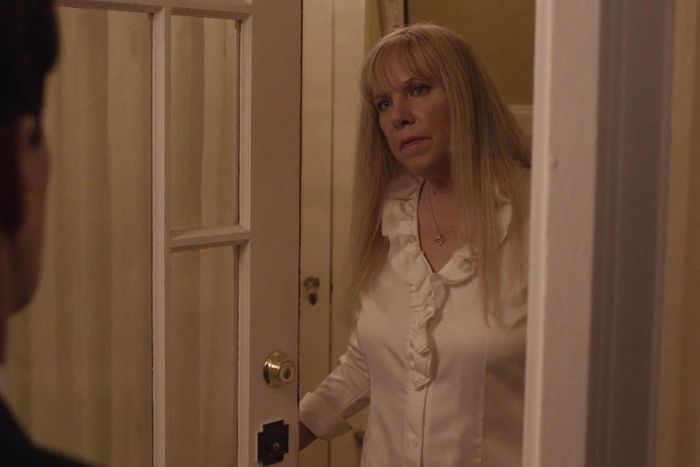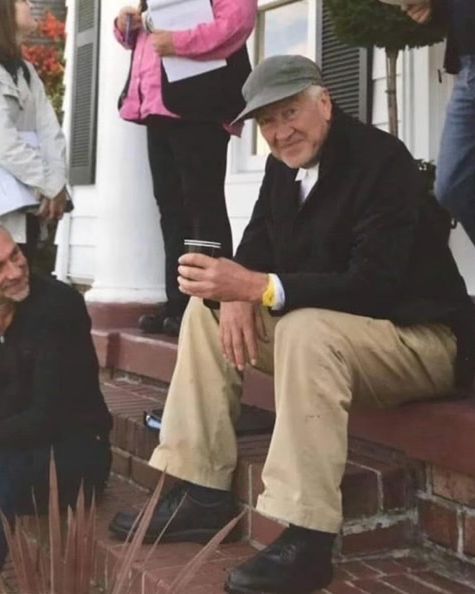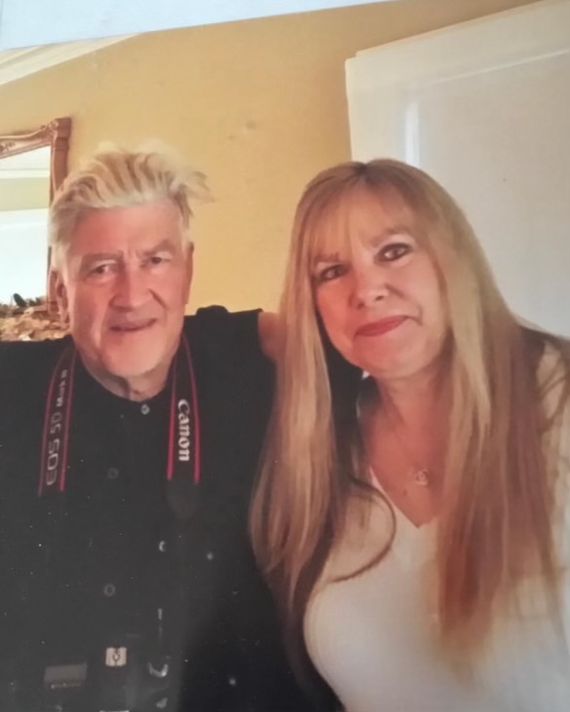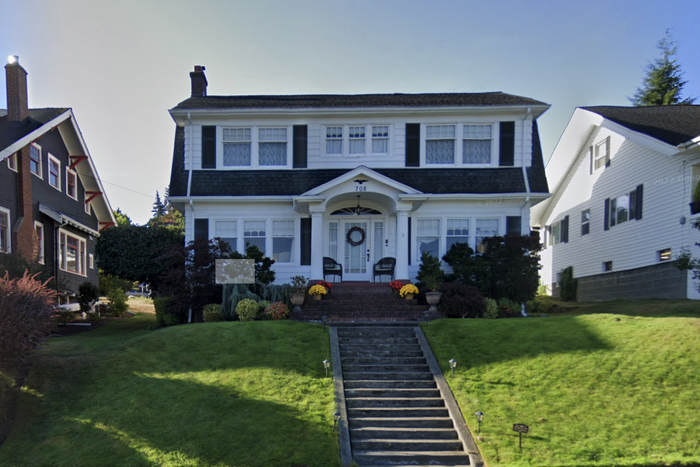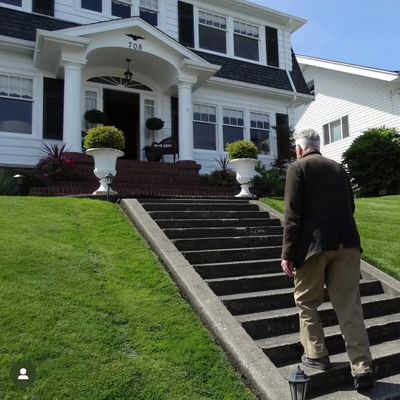
In the hours since David Lynch’s death, the tributes and memories have been pouring in from his actors, his collaborators, his fans, his family, his friends. My mind went quickly to Mary Reber. Reber lives on a quiet street in Everett, Washington, in a beautiful home that also happens to be one of the most significant settings and symbols in the larger Lynch universe: Laura Palmer’s house. In 2014, while Lynch was filming Twin Peaks: The Return for several weeks at Reber’s house, he spontaneously asked her to appear in the show’s final scene as the home’s alt-universe owner, Alice Tremond, forever entrenching her into the elaborate and beloved Twin Peaks mythology.
In the years since The Return’s conclusion, reality and the dream world have continued to blur in that deliciously Lynchian way. Reber, now a true Twin Peaks obsessive herself, generously allows vetted fans to tour her/Laura/Alice’s house, functioning as a sort of shepherd for what has become a cherished pilgrimage site for those who see themselves in the tormented Laura. Warm and empathic, Reber often ends up listening to her visitors’ stories of trauma and heartache and comforting them with a combination of wisdom from her own life and thoughtful analyses of Lynch’s work. In many ways, Reber has become inextricable from Lynch’s fandom; her home is an emotional nexus and unofficial museum, teeming with talismans and pieces of art that patrons have left for Laura and Reber over the years.
A longtime Lynch freak myself with at least two Twin Peaks–inspired tattoos, I was lucky enough to tour the house with Reber a few years ago, an experience so profound and strange and wonderful that I still have trouble describing it. Part of what made the whole thing so special was my long conversation with Reber, which, as most exchanges about Lynch’s work do, fluidly moved between the personal and the Peaks. She and I have kept in touch since, which isn’t entirely unusual for her; she can’t help but connect deeply with her visitors. I wanted to talk to her as a way to access that connection, to plug into the Twin Peaks matrix, so I called her the day after Lynch’s death to ask, Was the house already turning into a vigil à la Bob’s Big Boy? How was the international Twin Peaks community faring, and what had she heard from them?
Mary! How are you doing?
Well, you know that I lost my son a couple of years ago. My son James is the one who said, “Mom, you gotta watch Twin Peaks!” He was really into it. Monday would be his birthday. But it’s also David Lynch’s birthday on Monday. Synchronicities like that really play a part in this show. People who come to visit, people in my life, woven throughout the show. And David talks about that a lot. It doesn’t surprise me that they have the same birthday.
That’s really beautiful. What do you remember about the first time you met David?
My ex and I had just bought this house in 2014. We were out running errands and came back and there was a notice at the door that said, “We want to film a movie at your house. Call the location guy.” He came out that night and said there’d be a director from Hollywood coming out later. He didn’t say what the show was, but there were simultaneous tweets from David Lynch and Mark Frost saying, “That gum you like is going to come back in style.” So I kind of figured, My house, those tweets, it’s gotta be Twin Peaks.
Sure enough, on January 1, David Lynch shows up with his producer Sabrina Sutherland and Scott Cameron, his first AD. He was in the house for about 40 minutes. I’m not a starstruck person — I was impressed with David and his work, but I wasn’t fawning all over him. We just chatted. I was kind of disappointed: I asked, “Do you wanna see the fan?” And he goes, “No, that’s okay, I’m fine.” He’s seen the fan before! He said he’d be in touch. He came out again in April, July, and then October he started filming. They were here for about 12 days.
And when did he ask you to be in the show?
He was standing by the front door and writing something and quietly talking to a girl. I was trying to listen, of course, but I couldn’t hear. Then he came into the kitchen, where I was making coffee and doughnuts, and he said, “Are you an actress?” I said “no.” He said, “Have you ever acted?” I said “no.” “Would you like to do a small part in the movie?” It was the first time I was ever quiet, I think. He said, “It’s not for sure. You can be in your own home, in your own clothes.” He was already trying to make me feel comfortable because he could tell it kind of threw me. I got notice from Sabrina that I’d be getting a script, which came in September, one month before we filmed.
Did you get a sense he was feeling you out or that he came up with the idea for Alice after meeting you?
I don’t know if it was talking to me first, or he was writing the scene and then thought, This should be the owner of the house. I know he doesn’t do typical auditions. He has a person in his head that he wants, and what he does is he talks to you like you and I are talking right now. He hears the cadence in your voice, looks in your eyes, and asks, Do they fit the person in my head I’m thinking about? I don’t know what went through his mind. But I would love to find out, to be honest with you.
You never asked?
No, because I don’t think he’d answer.
It’s so interesting that we’re both talking about him in the present tense. Can you tell me about finding out about his death and what the last 24 hours or so have been like?
I knew a couple of weeks ago that he was failing. That it was going to be soon. It was anticipatory grief. You knew he was going to go, but you didn’t know when. That was the worst. But I woke up yesterday and everything felt really empty. There was a total silence. Then all of a sudden, I saw Sabrina’s message that he had passed. From that point on, there were tons of condolences. “Big hugs. I know he meant a lot to you, Mary.” It was weird. I’m not really his personal family or anything. But everybody knew he had filmed here and that it was his last project.
Why do you think people reached out?
I think grief hits people and they don’t know what to do with it. So they reach out for somebody or something tangible to hang onto. I think people felt that they could do that with me. That makes me feel like I was able to help out in a real way.
Did you feel like they wanted you to be there for them to be comforting?
I feel like they were there for me and I was there for them. I got condolences when my son died, but this was even more so. I was kind of surprised because people really do consider anybody who has worked with David to be part of it. I’ve been doing these tours for nine years, so I’ve spoken intimately with a lot of people. Most of the time, I hear their trauma stories. It’s been an extension of that, maybe. David creates this atmosphere where his art unites. And I think people need to feel united right now. That’s one legacy that I think he’s left. Everybody goes, “Oh, it’s almost like a cult, Twin Peaks people.” It’s because it touches the core of their being.
There is something so fascinating going on at your house. I could feel it. Laura Palmer’s house is this receptacle for her trauma. All of these horrible things happen there on the show. And you’re this wonderful person who invites people to share themselves with you. It’s become this sort of lighthouse for David’s work and Laura and you. What do you think the house means to people?
There was one guy from Spain who came here, he’s a psychologist for LGBTQ people. He handed me a little ladybug. He goes, “I want you to keep this here.” A lot of people leave things in Laura’s room, in this little alcove. People bring their art. This man said, “I was bullied as a child. And Twin Peaks saved my life. In Spain, a person who is queer is called a ‘ladybug.’” So he asked me to keep the ladybug on my mantle, and I did. Last weekend, somebody left crystal lights in Laura’s room that depict Twin Peaks. And someone’s daughter handed me an angel ring and said, “I want you to keep this in Laura’s room so she knows that there are still angels.” A famous musician reached out to me yesterday, and I told them to come here and write a song and perform it. He wants to do a David Lynch memorial concert at the house.
People leave parts of themselves here. Because Laura has given a face to trauma. Sheryl Lee said once to me, “We didn’t win a ton of awards for Fire Walk With Me. But so many people have come to me talking about incest and trauma. I wouldn’t trade any of that for an award.”
Does it ever get heavy for you, all of this?
You know, I lost my son, and he passed away here. Nothing throws you like losing a child. It’s been three years since James passed. You know you’ve healed when you can talk to other people about your pain. I have an ashtray here, it’s supposed to depict Sarah Palmer’s ashtray with all of her cigarettes. But they’re actually James’s. It’s an homage to him.
I know a lot of people don’t really like people. [Laughs] But I really do. Have there been a few tough ones here? Absolutely. There’s always a fringe. But for the most part I’ve really enjoyed everybody who’s come here.
Have people been by in the last 24 hours?
There was a guy yesterday who said, “Sorry to bother you. Is it okay if I take some pictures?” I said, “Yes, absolutely.” I didn’t let him inside. I do have some people reaching out for tours. I just remember when my son passed, I wanted his clothes. His last glass that he drank out of. You want something tangible. A recording. Something you can glom onto. You feel like you’re out in the middle of nowhere: “What do I do with this grief?” You have to find a place to plant it.
Are people leaving tangible things, like the vigil at Bob’s Big Boy, near your house?
If anybody wants to drop wine or chocolates, I’m happy for them to do so! [Laughs] Sometimes it’s like, I can’t have all of this stuff in my house. But when it means something to somebody … It sounds trite, but I’m using this house, not as a memorial, because it’s my home, but if somebody wants to leave something here, they can. It’s so important for me to share it. Within boundaries of course.
Well, that’s a very important note! This is your house. People can’t be bugging or harassing you.
I can vet people and make sure they’re real Twin Peaks fans. If I have a funky feeling about somebody, I turn them away. I’ve had to learn boundaries through the years. I’m empathic and that hasn’t always served me well. But I’ve done a lot of healing.
What’s the first thing that comes to mind when you think of David?
He treated everybody the same. We came back from makeup, Kyle MacLachlan, Sheryl, and myself. They’re very seasoned, and I’m an ordinary person. And he treated us all the exact same. To me, that was a blessing, being directed by David Lynch. It was therapeutic. I was ending my 34-year-old marriage to my ex. And David was the last really super-nice man that was kind to me.
The way that he saw and depicted women has been a major focus of a lot of the tributes.
Yes. He doesn’t candy-coat anything. I think women really appreciate him for that. He’s laying out what it’s really like. Sometimes we need something raw: This is what it feels like. And he does this thing called a callback. When every character is done with their scene, he has a circle of all the cast and crew, and you stand in the middle. And he thanks you. He said, “Mary, thank you so much for letting us use your house. You did a great job.” And then everybody claps for you. He did it three times for Kyle: one for Dougie, one for Cooper, one for his doppelganger.
One really cool story is that I’d mentioned to him that my daughters wanted to meet him. I thought it went in one ear and out the other. I think the filming ended at 2 a.m. one day. He was sitting on a chair in the living room. He said, “Mary, I know your daughters wanted to meet me. I’d love to meet them now.” But they’d just left! Despite all that’s going through his head, he remembered that.
He’s such a hard worker. And not a small talker. [Laughs] I never spoke to him again after that. I have seen Kyle and talked to Sheryl. But I haven’t seen David again. If I hadn’t been so nervous about acting, I wish I would have sat and had more conversations with him. When somebody passes you always think, I should have.
What are other synchronicities between the house and you and David and Twin Peaks?
The first Blue Rose case was Lois Duffy; that’s my maiden name, Duffy. My character’s name was Alice; I lost my mom over 20 years ago, and her name was Alice. Things like that. David calls them “happy accidents.” You have to make room for them. That you don’t have such an intense plan that you don’t see these things happening around you.
I’m so glad you’re the one taking care of the house. What you do for people is really lovely.
Don’t you feel united through this show? With the fires in California, with everything happening in people’s lives, his death is still uniting people. We need each other, we need that interaction. We’re missing it greatly, I think. People say, “What are you doing? You’re letting complete strangers into your home.” I could look at it that way. Or I could look at it as, This person needs to see this place, and we need to have this communication. In this day and age, I suppose it’s a strange thing to do, but it’s also been the biggest blessing. When we overcome those fears, that’s when we really hit the big stuff.
More on David Lynch
- Laura Dern, Isabella Rossellini, and More Remember David Lynch
- Think You’ve Seen All of David Lynch’s Work? Think Again.
- David Lynch’s ‘Last Project’ Could’ve Been a Netflix Limited Series



